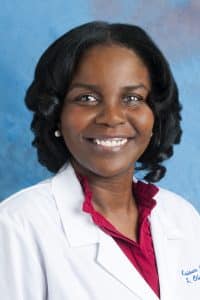
By Dr. Odicie Fielder-Kimbrough, oncologist at Kaiser Permanente of Georgia
While breast cancer awareness has grown, misconceptions persist, leading to confusion and missed opportunities for early detection and prevention. In fact, according to the National Breast Cancer Foundation, when localized breast cancer is diagnosed early and treated promptly, the 5-year survival rate is 99%.
As we recognize Breast Cancer Awareness Month, I want to debunk myths and provide accurate information to help you better understand your risks, take proactive steps and seek timely treatment.
Below are five common misunderstandings about risk factors, symptoms and screening that I believe can result in delayed diagnoses and inadequate care.
Myth: Breast Cancer Always Causes Noticeable Symptoms
Many people believe breast cancer always presents obvious symptoms, such as a noticeable lump. However, some signs can be subtle or go unnoticed.
Early-stage breast cancer might not cause any pain or discomfort and symptoms can vary. Changes in breast size, shape or skin texture, as well as nipple discharge or inversion, can be warning signs.
Regular mammograms and self-examinations are critical tools in detecting breast cancer early. While it’s true that mammograms use a small amount of radiation, the benefit far outweighs the risk. The level of radiation exposure from a mammogram is nearly the same as what a person would naturally receive from their environment in a few weeks.
Myth: You Can’t Prevent Breast Cancer
While it’s true that not all cases of breast cancer can be prevented, there are several proactive measures you can take to reduce your risk. Breast cancer can be influenced by various lifestyle choices and risk factors such as diet, physical activity, smoking habits and alcohol consumption. By making informed decisions in these areas, you may play a role in reducing your likelihood of developing the disease.
If breast cancer runs in your family, it’s crucial to monitor your health closely and speak to your doctor about personalized screening strategies.
Myth: Only Women Get Breast Cancer
One of the most widespread misconceptions is that breast cancer only affects women. Although rare, men can develop breast cancer, particularly if they carry specific genetic mutations, such as BRCA1 or BRCA2.
The average male lifetime risk of getting breast cancer is about 1 in 726 and they often receive diagnoses at later stages when the disease is more advanced.
In fact, according to The American Cancer Society, about 2,790 men are expected to be diagnosed with invasive breast cancer in 2024 and approximately 530 men will die from the disease.
Myth: All Breast Cancers Are the Same
Many people believe that breast cancer is a single disease. In reality, it encompasses a wide variety of types, each with its own characteristics, behaviors and treatment responses.
Types of breast cancer include ductal carcinoma in situ, invasive ductal carcinoma, inflammatory breast cancer and metastatic breast cancer. Understanding their differences is crucial for effective treatment and management.
Myth: Once Treatment Ends, the Journey is Over
The journey doesn’t end after finishing treatment. Survivors need continued care and support to manage the long-term effects of treatment and monitor for recurrence.
Establishing a survivorship care plan with a healthcare provider can help survivors navigate this next phase, focusing on regular check-ups, lifestyle adjustments and emotional support.
By debunking common breast cancer myths and understanding risk factors, individuals can take control of their health. Regular screenings, a healthy lifestyle and ongoing communication with healthcare providers are vital steps in preventing and managing breast cancer.
Early detection and proactive action offer the best chance for a healthy, cancer-free future.